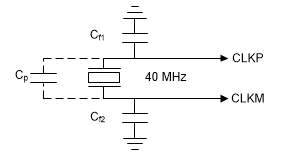ZHCSRC3A December 2022 – March 2024 IWRL6432
PRODUCTION DATA
- 1
- 1 特性
- 2 应用
- 3 说明
- 4 功能方框图
- 5 Device Comparison
- 6 Terminal Configurations and Functions
-
7 Specifications
- 7.1 Absolute Maximum Ratings
- 7.2 ESD Ratings
- 7.3 Power-On Hours (POH)
- 7.4 Recommended Operating Conditions
- 7.5 VPP Specifications for One-Time Programmable (OTP) eFuses
- 7.6
Power Supply Specifications
- 7.6.1 Power Optimized 3.3V I/O Topology
- 7.6.2 BOM Optimized 3.3V I/O Topology
- 7.6.3 Power Optimized 1.8V I/O Topology
- 7.6.4 BOM Optimized 1.8V I/O Topology
- 7.6.5 System Topologies
- 7.6.6 Internal LDO output decoupling capacitor and layout conditions for BOM optimized topology
- 7.6.7 Noise and Ripple Specifications
- 7.7 Power Save Modes
- 7.8 Peak Current Requirement per Voltage Rail
- 7.9 RF Specification
- 7.10 Supported DFE Features
- 7.11 CPU Specifications
- 7.12 Thermal Resistance Characteristics
- 7.13
Timing and Switching Characteristics
- 7.13.1 Power Supply Sequencing and Reset Timing
- 7.13.2 Synchronized Frame Triggering
- 7.13.3 Input Clocks and Oscillators
- 7.13.4 MultiChannel buffered / Standard Serial Peripheral Interface (McSPI)
- 7.13.5 RDIF Interface Configuration
- 7.13.6 General-Purpose Input/Output
- 7.13.7 Controller Area Network - Flexible Data-rate (CAN-FD)
- 7.13.8 Serial Communication Interface (SCI)
- 7.13.9 Inter-Integrated Circuit Interface (I2C)
- 7.13.10 Quad Serial Peripheral Interface (QSPI)
- 7.13.11 JTAG Interface
-
8 Detailed Description
- 8.1 Overview
- 8.2 功能方框图
- 8.3 Subsystems
- 8.4 Other Subsystems
- 8.5 Memory Partitioning Options
- 8.6 Boot Modes
- 9 Monitoring and Diagnostics
- 10Applications, Implementation, and Layout
- 11Device and Documentation Support
- 12Revision History
- 13Mechanical, Packaging, and Orderable Information
7.13.3.1 Clock Specifications
The requires external clock source (that is, a 40MHz crystal or external oscillator to CLKP) for initial boot and as a reference for an internal APLL hosted in the device. An external crystal connected to the device pins Figure 7-10 shows the crystal implementation.
 Figure 7-10 Crystal Implementation
Figure 7-10 Crystal ImplementationThe load capacitors, Cf1 and Cf2 in Figure 7-10, should be chosen such that Equation 1 is satisfied. CL in the equation is the load specified by the crystal manufacturer. All discrete components used to implement the oscillator circuit should be placed as close as possible to the associated oscillator CLKP and CLKM pins.

Table 7-17 lists the electrical characteristics of the clock crystal.
| NAME | DESCRIPTION | MIN | TYP | MAX | UNIT |
|---|---|---|---|---|---|
| fP | Parallel resonance crystal frequency | 40 | MHz | ||
| CL | Crystal load capacitance | 5 | 8 | 12 | pF |
| ESR | Crystal ESR | 50 | Ω | ||
| Temperature range | Expected temperature range of operation | –40 | 105 | °C | |
| Frequency tolerance | Crystal frequency tolerance(1)(2)(3) | –200 | 200 | ppm | |
| Drive level | 50 | 200 | µW | ||
In the case where an external clock is used as the clock resource, the signal is fed to the CLKP pin only; CLKM is grounded. The phase noise requirement is very important when a 40MHz clock is fed externally. Table 7-18 lists the electrical characteristics of the external clock signal.
| PARAMETER | SPECIFICATION | UNIT | |||
|---|---|---|---|---|---|
| MIN | TYP | MAX | |||
| Input Clock: External AC-coupled sine wave or DC-coupled square wave Phase Noise referred to 40MHz |
Frequency | 40 | MHz | ||
| AC-Amplitude | 700 | 1200 | mV (pp) | ||
| DCVil | 0.00 | 0.20 | V | ||
| DCVih | 1.6 | 1.95 | V | ||
| Phase Noise at 1kHZ | –132 | dBc/Hz | |||
| Phase Noise at 10 kHZ | –143 | dBc/Hz | |||
| Phase Noise at 100 kHZ | –152 | dBc/Hz | |||
| Phase Noise at 1MHz | –153 | dBc/Hz | |||
| Duty Cycle | 35 | 65 | % | ||
| Frequency Tolerance | -200 | 200 | ppm | ||